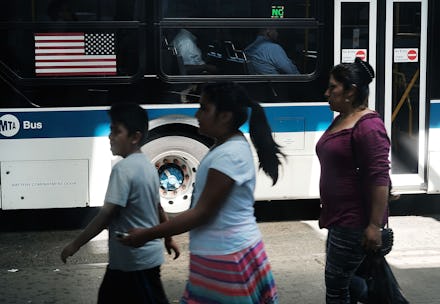Why Latino citizens are more worried about deportation even as numbers decrease

“You can’t deport a U.S. citizen,” said a friend recently. My friend is correct on the law.
But that doesn’t stop millions of U.S. citizens from fearing deportation anyway.
In a study published April 6, I found Latino U.S. citizens’ deportation fears to be on the rise. Whereas 41% worried about deportation in 2007, 48% did in 2018. This amounts to about 13.6 million Latino U.S. citizens fearing deportation.
My research, and that of several other scholars, outlines several reasons why Latino U.S. citizens might increasingly fear a form of punishment thought to be reserved for people who lack citizenship.
Deportation fears
The Pew Research Center regularly surveys Latino adults who are U.S. citizens and non-citizens. Six times between 2007 and 2018, they asked different survey participants the same question: “Regardless of your own legal status, how much, if at all, do you worry that you, a family member, or a close friend could be deported? Would you say that you worry a lot, some, not much, or not at all?”
My analysis of these people’s answers reveals a surprising pattern. Latino non-citizens, encompassing undocumented and documented immigrants vulnerable to deportation, report a high, but stable, level of fear.
But U.S. citizens, including naturalized immigrants and those born in the country who are ostensibly immune to deportation, report increasing fears.
These changes don’t reflect increasing deportation rates nationwide, which are lower now than they were for much of the Obama administration. Instead, U.S. citizens’ growing fears reflect heightened national attention to deportation policy and practice since the 2016 U.S. presidential election.
Deportable family members
Deportation touches U.S. citizens through deportable family members and loved ones. An analysis I received from the University of Southern California’s Center for the Study of Immigrant Integration reveals to what extent.
Almost 9 million U.S. citizens, most of them children, have at least one undocumented family member. Four out of five of these U.S. citizens are Latino.
But this count captures only a fraction of U.S. citizens with deportable relatives. Millions more have household members with provisional statuses like a visa or green card. Some 20.5 million U.S. citizens — or one of every 13 U.S. citizens — have a relative who is deportable. Sixty percent of these U.S. citizens are Latino.
These Americans are not immune to the effects of the laws and policies targeting their families and communities. When U.S. citizens fear for their loved ones’ safety, they are less likely to go to school, to get routine medical care and to call the police in an emergency.
Mistaken as deportable
Immigration law does not mention race, but the way it is enforced has racially unequal consequences.
A disproportionate share of Latino U.S. citizens have deportable relatives. Latin American non-citizens represent more than 90% of all deportations, even though they account for 57% of all non-citizens.
When laws primarily affect a single racial group, federal immigration officials and everyday people can mistakenly recognize U.S. citizens as deportable. For example, the federal government deported about 200,000 U.S. citizens of Mexican descent during the Great Depression, under the assumption they were undocumented.
This mistaken recognition is happening today too. Between 2007 and 2015, more than 1,500 U.S. citizens — many Latino — were unlawfully detained for their suspected deportability. In a 2018 study, researchers found that white Americans most suspected Salvadoran and Mexican immigrants of being undocumented — and least suspected Italians and Canadians. Media reports continue to depict cases of Latino U.S. citizens unlawfully detained for suspected immigration violations.
U.S. citizens are not deportable by law. But they still worry about being mistaken as deportable, given the racially unequal enforcement of contemporary immigration laws and policies.
Mounting obstacles to citizenship
Growing uncertainty about just how much citizenship shields against deportation also contributes to U.S. citizens’ fears. Two recent events help illustrate this point.
The first is the Trump administration’s “public charge” rule, recently allowed to move forward by the Supreme Court. Non-citizens have long been ineligible to receive public assistance for themselves. The new rule penalizes non-citizens who receive public assistance to temporarily support their eligible U.S.-citizen children. The penalty is that non-citizens cannot get a green card, a precondition for citizenship.
Although the rule affects fewer than 1% of non-citizens, the uncertainty it has created is already detaching fearful families, most of whom are low-income with origins in Latin America, from the social safety net. About one in seven adults in immigrant families — and one in five adults in poor immigrant families — reported in a recent Urban Institute survey that they or a family member avoided the social safety net for this reason.
Intensifying denaturalization efforts are also heightening fears. Denaturalization is the stripping of an immigrant’s acquired citizenship. Historically, it was reserved for immigrants who committed war crimes; today, it is increasingly used as a tool for federal immigration enforcement.
One study counts 421 denaturalization cases filed against U.S. citizens between 2013 and 2018. This number of cases is small when compared to the population of 20 million naturalized U.S. citizens. But ongoing efforts that date back to the Obama administration risk adding to the number of denaturalization cases. The Justice Department recently created an official section within its immigration office to facilitate this process, due to “the growing number of referrals anticipated from law enforcement agencies.”
Few naturalized citizens will ultimately lose their citizenship. But these publicized denaturalization efforts will exacerbate fears that the rights and privileges of U.S. citizenship are tenuous for immigrants in the country.
In response to my friend’s reminder that U.S. citizens are not deportable by law, I say this: You’re right. But the law as it’s written doesn’t always match how it’s enforced.
This article was originally published on The Conversation by Asad L. Asad at Stanford University. Read the original article here.